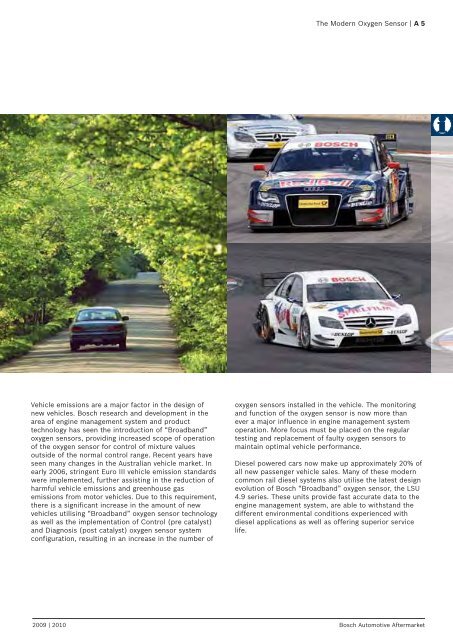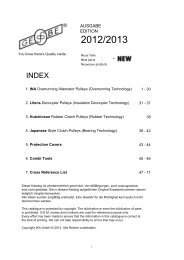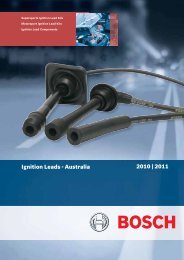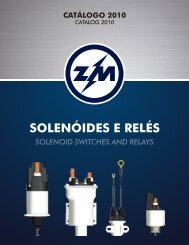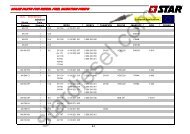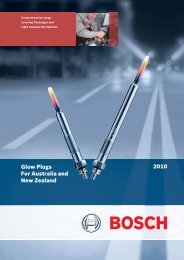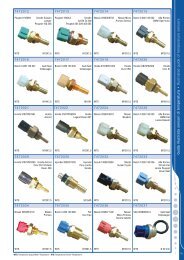- Page 1 and 2: Direct Fit and Universal Applicatio
- Page 3 and 4: A 1Oxygen SensorsProduct Informatio
- Page 5: The Bosch Automotive Story | A 3In
- Page 9 and 10: Bosch Oxygen Sensor Design Types |
- Page 11 and 12: Oxygen Sensor Evolution | A 990,000
- Page 13 and 14: Oxygen Sensor Evolution | A 11Unive
- Page 15 and 16: Oxygen Sensor Construction and Oper
- Page 17 and 18: Oxygen Sensors - System Application
- Page 19 and 20: Testing of Oxygen Sensors | A 17Sim
- Page 21 and 22: Causes and Effects of Oxygen Sensor
- Page 23 and 24: The Bosch Yellow Jackets Edition 20
- Page 25 and 26: Diagnose Your Sensors | A 23KTS oxy
- Page 27 and 28: | B1Vehicle Application ListingB2 |
- Page 29 and 30: ASTON MARTIN | B3Brera939 01.06 939
- Page 31 and 32: AUDI | B58P1 07.03 - 08.04 BDB 6 3.
- Page 33: AUDI | B78E2, B6 03.01 - 12.04 BBJ
- Page 37 and 38: AUDI | B118E2, B6 03.03 - 12.04 BBK
- Page 39 and 40: BENTLEY | B138C2, B4 09.91 - 12.94
- Page 41 and 42: BMW | B15X5E 53 03.99 - 09.03 44 8S
- Page 43 and 44: BMW | B17316ti CompactE 36 10.94 -
- Page 45 and 46: BMW | B19323i TouringE 91 09.05 N52
- Page 47 and 48: BMW | B21E 60 03.07 N53 B25A 6 2.5
- Page 49 and 50: BMW | B23645CiE 63 01.04 - 09.05 N6
- Page 51 and 52: CITROEN | B25CHRYSLERCrossfireZH 03
- Page 53 and 54: DAIHATSU | B27DAEWOOCielo08.94 - 08
- Page 55 and 56: FORD | B29456456GT51255057506.00 F1
- Page 57 and 58:
FORD | B31EB II 10.92 - 04.93 J 8 5
- Page 59 and 60:
FORD | B33FestivaWB 04.94 - 12.96 U
- Page 61 and 62:
FORD | B35DC II 03.92 - 02.95 Z 8 5
- Page 63 and 64:
HOLDEN | B37VS II 09.96 - 04.98 VU
- Page 65 and 66:
HONDA | B39LG 09.94 - 09.96 7AFE 4
- Page 67 and 68:
HONDA | B41GH 12.98 - 12.01 D16W2 4
- Page 69 and 70:
HYUNDAI | B43VY II 09.03 - 09.04 VF
- Page 71 and 72:
JAGUAR | B45TucsonJM 08.04 G4GC 4 2
- Page 73 and 74:
LAND ROVER GROUP | B47WranglerTJ 01
- Page 75 and 76:
MAZDA | B49MASERATIQuattroporte03.0
- Page 77 and 78:
MERCEDES-BENZ | B51BJ 07.99 - 09.03
- Page 79 and 80:
MERCEDES-BENZ | B53CLK55 AMGW208 05
- Page 81 and 82:
MERCEDES-BENZ | B55W219 04.06 M 273
- Page 83 and 84:
MERCEDES-BENZ | B57W203 06.05 - 07.
- Page 85 and 86:
MERCEDES-BENZ | B59E280W124 07.93 -
- Page 87 and 88:
MERCEDES-BENZ | B61SLK 350W171 12.0
- Page 89:
MERCEDES-BENZ | B63S430W220 10.98 -
- Page 92 and 93:
B66 | MITSUBISHIMITSUBISHIMChalleng
- Page 94 and 95:
B68 | NISSANNNISSANLaurel06.97 - 08
- Page 96 and 97:
B70 | PEUGEOTPPEUGEOTN5 05.97 - 10.
- Page 98 and 99:
B72 | PORSCHEPPORSCHECarrera GT10.0
- Page 100 and 101:
B74 | RENAULTRRENAULTBB./CB./SB. 03
- Page 102 and 103:
B76 | ROVERROVER7582701.99 - 05.05
- Page 104 and 105:
B78 | SAABSAAB09.93 - 12.98 B 234 I
- Page 106 and 107:
B80 | SUBARUSUBARUGD,GG 07.01 - 05.
- Page 108 and 109:
B82 | TOYOTATTOYOTAMCV36R 09.02 - 0
- Page 110 and 111:
B84 | TOYOTATOYOTAACA 20/21 05.00 -
- Page 112 and 113:
B86 | VOLVOVOLVOVV4001.96 - 07.99 B
- Page 114 and 115:
B88 | VOLVO940960VOLVO09.95 - 07.97
- Page 116 and 117:
B90 | VWVVWGolf V1K1 08.04 - 11.05
- Page 118 and 119:
B92 | VWVVW3C2 11.05 BWA 4 2.0 Cont
- Page 120 and 121:
2B 94 | NotesBosch Automotive After
- Page 122 and 123:
C 2 | Universal Oxygen Sensor Progr
- Page 124 and 125:
C 4 | Universal Oxygen Sensor Insta
- Page 126 and 127:
C 6 | Cross Reference Direct Fit to
- Page 128 and 129:
C 8 | Cross Reference Direct Fit to
- Page 130 and 131:
C 10 | Cross Reference Direct Fit t
- Page 132 and 133:
C 12 | Cross Reference Direct Fit t
- Page 134 and 135:
14C 14 | Product Images0 258 001 05
- Page 136 and 137:
16C 16 | Product Images0 258 002 21
- Page 138 and 139:
18C 18 | Product Images0 258 003 04
- Page 140 and 141:
20C 20 | Product Images0 258 003 14
- Page 142 and 143:
22C 22 | Product Images0 258 003 32
- Page 144 and 145:
24C 24 | Product Images0 258 003 42
- Page 146 and 147:
26C 26 | Product Images0 258 003 54
- Page 148 and 149:
28C 28 | Product Images0 258 003 71
- Page 150 and 151:
30C 30 | Product Images0 258 003 81
- Page 152 and 153:
32C 32 | Product Images0 258 003 95
- Page 154 and 155:
34C 34 | Product Images0 258 005 14
- Page 156 and 157:
36C 36 | Product Images0 258 005 70
- Page 158 and 159:
38C 38 | Product Images0 258 005 73
- Page 160 and 161:
40C 40 | Product Images0 258 006 30
- Page 162 and 163:
42C 42 | Product Images0 258 986 00
- Page 164 and 165:
44C 44 | Product Images0 258 986 60
- Page 166 and 167:
46C 46 | Product ImagesF 00H L00 05
- Page 168 and 169:
48C 48 |NotesBosch Automotive After
- Page 170 and 171:
D 2 | Supporting Stone Brothers Rac
- Page 172 and 173:
D 4 | Oxygen Sensor Type Code LSM 1
- Page 174 and 175:
D 6 | Oxygen Sensor Type Code LSM 1
- Page 176 and 177:
D 8 | Oxygen Sensor Type Code LSU 4
- Page 178 and 179:
D 10 | Oxygen Sensor Type Code LSU
- Page 180 and 181:
D 12 |NotesBosch Automotive Afterma
- Page 182 and 183:
D 14 |NotesBosch Automotive Afterma
- Page 184:
Assuring your workshop’s future s


